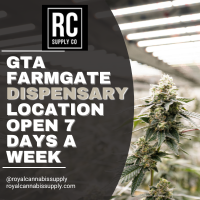This week on Stratcann, we covered a BC company that is asking the province to use part of its share of excise tax revenues to aid struggling cannabis businesses. We also covered an ongoing string of grievances between cannabis producers and processors, and touched on the continuing issue of Canadian pot firms that are sitting on massive stockpiles of dried cannabis flower.
We also looked at new developments in the ongoing plight of some cannabis producers to use a perceived loophole in the regulations to market orally ingested cannabis products as ‘extracts’ to circumvent dosage and packaging limitations imposed on edible cannabis products by Health Canada.
Despite this being the case, on Friday, Organigram said it was making Jolts available again in several provinces.
Also, one year into new farmgate rules in BC, only a handful of producers are even exploring the idea due to what some say are an ill-conceived set of rules surrounding the program’s implementation.
Health Canada expects the volume of cannabis exports leaving Canada to continue to increase, and cannabis sales continue to increase in Nova Scotia.
Lastly, we ran a profile on a company looking to aid would-be Canadian cannabis exporters in obtaining their EU-GMP certification.
In other cannabis news this week…
Statistics Canada analyst Dieter Garriguet spoke with CBC about the state of cannabis research and knowledge five years into legalization, while New Zealand publication The BFD also published an opinion piece marking the five-year anniversary.
Politico made mention of George Smitherman, president and CEO of the Cannabis Council of Canada (C3), lamenting that he was unable to bring samples to the House finance committee where he appeared as a witness on Thursday.
A new poll shows that within Canada, Albertans and British Columbians are among the least likely to view the effects of legalization positively. At the same time, the territorial government in the Yukon announced that it is launching a five-year review of the Cannabis Control and Regulation Act there. CBC ran a piece asking Canadian children what they think of legalization five years in.
As large cannabis companies continue to suffer from the hubris of the early days of legalization, Sundial Cannabis announced the closure of its flagship production facility in Olds, Alberta, a rural community of about ten thousand people.
High Tide announced it was opening its 157th Canna Cabana branded retail cannabis location in Canada and the 78th in Alberta in a former Fire and Flower location in Calgary.
In BC, Pure Sunfarms says it’s launching its first infused one-gram blunt, while a few local media outlets covered ShuCanna’s grand opening of its farmgate store in Salmon Arm. (StratCann covered their soft launch earlier this year).
A resident of Caledon, a small municipality in Ontario, is asking the city to revisit its decision to not allow legal cannabis stores.
While cannabis has been legal for half a decade now, this doesn’t mean that the criminal element has been completely assimilated or wiped out, as evidenced by a recent police action in Montreal that yielded 140 kilograms of cannabis, 1.5 kilograms of powdered methamphetamine, and $40,000 in cash. However, sentences for cannabis-related activities are still receiving relatively lenient penalties.
The SQDC named former food services executive Suzanne Bergeron as its new president and CEO.
Aurora Cannabis announced that it has recently completed a confidential settlement with Willow Biosciences regarding patent infringement, where the latter is alleged to have used technology developed by former Aurora CSO Jonathan Page to biosynthesize cannabinoids. Aurora also announced that it will reveal its second-quarter earnings on November 9.
Head Topics Canada reported that a BC Credit union is lobbying the feds to make it easier for financial institutions to work with cannabis businesses.
Scientific research in cannabis continues to progress, as a new study looked at the efficacy of CBD as a treatment for epilepsy in dogs.
Also, researchers in Ontario found that geographic proximity to cannabis stores coincided with increased use of mental health services for psychotic disorders, and Italian researchers found that cannabis use is associated with an increased risk of cardiovascular complications.
Cannabis International
A group of researchers from the University of Bangkok, Thailand, found that CBD does not interfere with certain forms of cancer treatment, and a study out of California found that cannabis packaging that appeals to youth also appeals more to grown adults, emphasizing the importance of packaging requirements and warning labels.
Scientists also say they discovered cannabidiol, a compound in cannabis known as CBD, in a common Brazilian plant, opening potential new avenues to produce the increasingly popular substance.
Two European organizations say they have received the final approval from the Swiss Federal Office of Public Health (BAG) to conduct a cannabis pilot study in Basel-Landschaft (Baselland), following approval from the Ethics Committee Northwest and Central Switzerland (EKNZ) last year. The study, led by Prof. Dr. Michael Schaub, Scientific Director of the ISGF, will examine the regulated sale of cannabis for non-medical purposes.
Up to 3,950 healthy adults living in the canton of Basel-Landschaft will be able to participate in the study in the future. Unlike other Swiss projects, the dispensing of cannabis will not take place via pharmacies or clubs but via stores as a point of sale, initially in the municipality of Allschwil.
Leafie ran a piece looking at Canadian cannabis company TGOD’s products making their way to the UK.
Finally, a team of researchers from the University of Tennessee Institute of Agriculture, Arizona State University, and Simon Fraser University in Canada reviewed the literature on Aspergillus, Penicillium, Fusarium, Mucor, and other fungi that can infect cannabis and hemp plants and produce mycotoxins.



